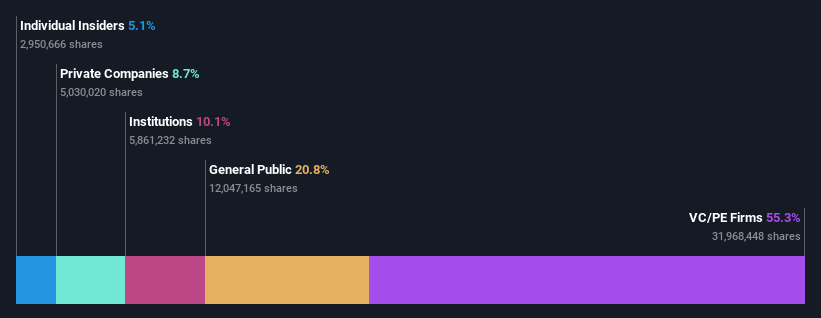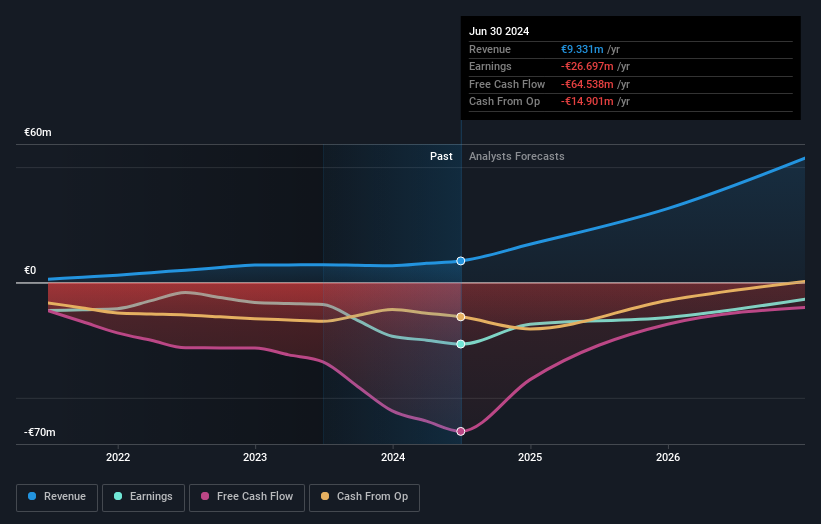- Netherlands
- /
- Machinery
- /
- ENXTAM:NXFIL
Private equity firms are NX Filtration N.V.'s (AMS:NXFIL) biggest owners and were hit after market cap dropped €39m

Key Insights
- Significant control over NX Filtration by private equity firms implies that the general public has more power to influence management and governance-related decisions
- 55% of the company is held by a single shareholder (Infestos Nederland BV)
- 10% of NX Filtration is held by Institutions
If you want to know who really controls NX Filtration N.V. (AMS:NXFIL), then you'll have to look at the makeup of its share registry. With 55% stake, private equity firms possess the maximum shares in the company. That is, the group stands to benefit the most if the stock rises (or lose the most if there is a downturn).
And following last week's 16% decline in share price, private equity firms suffered the most losses.
In the chart below, we zoom in on the different ownership groups of NX Filtration.
View our latest analysis for NX Filtration

What Does The Institutional Ownership Tell Us About NX Filtration?
Many institutions measure their performance against an index that approximates the local market. So they usually pay more attention to companies that are included in major indices.
NX Filtration already has institutions on the share registry. Indeed, they own a respectable stake in the company. This suggests some credibility amongst professional investors. But we can't rely on that fact alone since institutions make bad investments sometimes, just like everyone does. When multiple institutions own a stock, there's always a risk that they are in a 'crowded trade'. When such a trade goes wrong, multiple parties may compete to sell stock fast. This risk is higher in a company without a history of growth. You can see NX Filtration's historic earnings and revenue below, but keep in mind there's always more to the story.

Hedge funds don't have many shares in NX Filtration. Our data shows that Infestos Nederland BV is the largest shareholder with 55% of shares outstanding. This essentially means that they have extensive influence, if not outright control, over the future of the corporation. Meanwhile, the second and third largest shareholders, hold 8.7% and 5.1%, of the shares outstanding, respectively.
Researching institutional ownership is a good way to gauge and filter a stock's expected performance. The same can be achieved by studying analyst sentiments. Quite a few analysts cover the stock, so you could look into forecast growth quite easily.
Insider Ownership Of NX Filtration
The definition of an insider can differ slightly between different countries, but members of the board of directors always count. The company management answer to the board and the latter should represent the interests of shareholders. Notably, sometimes top-level managers are on the board themselves.
Most consider insider ownership a positive because it can indicate the board is well aligned with other shareholders. However, on some occasions too much power is concentrated within this group.
Shareholders would probably be interested to learn that insiders own shares in NX Filtration N.V.. In their own names, insiders own €10m worth of stock in the €205m company. This shows at least some alignment. You can click here to see if those insiders have been buying or selling.
General Public Ownership
With a 21% ownership, the general public, mostly comprising of individual investors, have some degree of sway over NX Filtration. This size of ownership, while considerable, may not be enough to change company policy if the decision is not in sync with other large shareholders.
Private Equity Ownership
Private equity firms hold a 55% stake in NX Filtration. This suggests they can be influential in key policy decisions. Some investors might be encouraged by this, since private equity are sometimes able to encourage strategies that help the market see the value in the company. Alternatively, those holders might be exiting the investment after taking it public.
Private Company Ownership
It seems that Private Companies own 8.7%, of the NX Filtration stock. It's hard to draw any conclusions from this fact alone, so its worth looking into who owns those private companies. Sometimes insiders or other related parties have an interest in shares in a public company through a separate private company.
Next Steps:
It's always worth thinking about the different groups who own shares in a company. But to understand NX Filtration better, we need to consider many other factors. To that end, you should be aware of the 2 warning signs we've spotted with NX Filtration .
If you are like me, you may want to think about whether this company will grow or shrink. Luckily, you can check this free report showing analyst forecasts for its future.
NB: Figures in this article are calculated using data from the last twelve months, which refer to the 12-month period ending on the last date of the month the financial statement is dated. This may not be consistent with full year annual report figures.
Valuation is complex, but we're here to simplify it.
Discover if NX Filtration might be undervalued or overvalued with our detailed analysis, featuring fair value estimates, potential risks, dividends, insider trades, and its financial condition.
Access Free AnalysisHave feedback on this article? Concerned about the content? Get in touch with us directly. Alternatively, email editorial-team (at) simplywallst.com.
This article by Simply Wall St is general in nature. We provide commentary based on historical data and analyst forecasts only using an unbiased methodology and our articles are not intended to be financial advice. It does not constitute a recommendation to buy or sell any stock, and does not take account of your objectives, or your financial situation. We aim to bring you long-term focused analysis driven by fundamental data. Note that our analysis may not factor in the latest price-sensitive company announcements or qualitative material. Simply Wall St has no position in any stocks mentioned.
About ENXTAM:NXFIL
NX Filtration
Develops, manufactures, and sells hollow fiber membrane modules in Netherlands, Europe, North America, Asia, and internationally.
Excellent balance sheet low.

